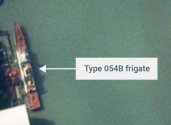My intent was to highlight the superiority of the Type 054B program over the West's alternatives. Apologies for apparently choosing the wrong topic. I used other comparison-type posts (eg Totoro May 17, 2020) as precedence.Are we now seriously talking about anonymous comments on a random blog post about a different ship in a flagship PLAN thread?
You are using an out of date browser. It may not display this or other websites correctly.
You should upgrade or use an alternative browser.
You should upgrade or use an alternative browser.
054B/new generation frigate
- Thread starter Blitzo
- Start date
Lethe
Captain
My intent was to highlight the superiority of the Type 054B program over the West's alternatives. Apologies for apparently choosing the wrong topic. I used other comparison-type posts (eg Totoro May 17, 2020) as precedence.
Comparisons between solutions arrived at by different navies are inevitable and often useful, but they also carry the potential to lead discussions further and further astray until we are no longer discussing what is ostensibly the subject of discussion, in this case China's 054B frigate program. Appropriate use of comparisons is thus a matter of emphasis, of ensuring that the focus remains on the subject of the discussion and that there is a clear connection between that subject and the particular comparisons that are used. The link you posted did not meet that criteria.
For an example of what I believe is a more useful comparison, using the same subjects: we can observe that both USN's Constellation-class and UK's City-class are both supposedly ASW-focused designs that lack traditional deck-mounted torpedo launchers. Is this simply cost-cutting in both cases, or does it reflect a recent set of judgments about the utility of such weapons that may also be relevant to PLAN combatants? Note that even though I believe that this is a useful avenue for discussion, it also clearly carries the risk of that discussion wandering astray over time, which bring us to the second element of such discussions: they require discipline from the respondents as well as the original poster, and ongoing supervision.
One of the great challenges facing a forum such as this one is increasing entropy, of growing disorder as the natural overlap between discussion topics leads to those discussions blurring together until we end up with a kind of homogenised China-flavoured soup that is ultimately not particularly useful for someone looking for information, discussion and updates about, in this case, the Type 054B frigate. Moderators and users have seen discussions led astray over time in this way on many occasions and hence can be quite critical and interventionist in "restoring order". As users, we should be conscious of this ongoing challenge and strive for our contributions to be "anti-entropic" ones, and also strive to set our egos aside when interventions do occur.
My intent was to highlight the superiority of the Type 054B program over the West's alternatives. Apologies for apparently choosing the wrong topic. I used other comparison-type posts (eg Totoro May 17, 2020) as precedence.
Comparisons between solutions arrived at by different navies are inevitable and often useful, but they also carry the potential to lead discussions further and further astray until we are no longer discussing what is ostensibly the subject of discussion, in this case China's 054B frigate program. Appropriate use of comparisons is thus a matter of emphasis, of ensuring that the focus remains on the subject of the discussion and that there is a clear connection between that subject and the particular comparisons that are used. The link you posted did not meet that criteria.
For an example of what I believe is a more useful comparison, using the same subjects: we can observe that both USN's Constellation-class and UK's City-class are both supposedly ASW-focused designs that lack traditional deck-mounted torpedo launchers. Is this simply cost-cutting in both cases, or does it reflect a recent set of judgments about the utility of such weapons that may also be relevant to PLAN combatants? Note that even though I believe that this is a useful avenue for discussion, it also clearly carries the risk of that discussion wandering astray over time, which bring us to the second element of such discussions: they require discipline from the respondents as well as the original poster, and ongoing supervision.
One of the great challenges facing a forum such as this one is increasing entropy, of growing disorder as the natural overlap between discussion topics leads to those discussions blurring together until we end up with a kind of homogenised China-flavoured soup that is ultimately not particularly useful for someone looking for information, discussion and updates about, in this case, the Type 054B frigate. Moderators and users have seen discussions led astray over time in this way on many occasions and hence can be quite critical and interventionist in "restoring order". As users, we should be conscious of this ongoing challenge and strive for our contributions to be "anti-entropic" ones, and also strive to set our egos aside when interventions do occur.
Lethe described it well.
The response from Dante80 wasn't anything personal to the quality of your post or the linking to that blog in general -- but for the specifics of this thread, it is at best very tangentially relevant to the thread's topic and has significant potential to act as a starting point for discussions that are gradually less relevant to the premise of the thread.
Threads on this forum benefit from not being active if there is no relevant or appropriate news to discuss -- the forum doesn't require activity in threads for the sake of engagement or activity, especially in the primary military threads.
Your intention was certainly good, no worries. Blitzo explained it well. It's just that many people use these specific threads for updates and news on specific PLAN naval projects, and have enabled thread notifications for this exact purpose.My intent was to highlight the superiority of the Type 054B program over the West's alternatives. Apologies for apparently choosing the wrong topic. I used other comparison-type posts (eg Totoro May 17, 2020) as precedence.
It is somewhat aggravating to get a notification for a thread reporting on a new naval class coming to life, only to get a somewhat irrelevant post about other stuff only tangentially connected to it.
I apologize for the backseat moderating.
Huangpu River is quite clear and clean.The anchor cover is open.


antiterror13
Brigadier
Huangpu River is quite clear and clean.
Yes, China has come a long way in environment protection in the last 15-20 years
I dont think thats the 054B. That appears to be one of the new coast guard hulls fitting out, the 054B is further up the river and pointing the other way as per previous images.From the same satellite photograph on the Hudong-Zhonghua shipyard released by CSIS.
Edit: Actually they seem to misidentify the 054B as an 052C and the 054A as 054B. The 054B is not pointing the other way anymore though, as I suggested before.

Last edited:
I dont think thats the 054B. That appears to be one of the new coast guard hulls fitting out, the 054B is further up the river and pointing the other way as per previous images.
Edit: Actually they seem to misidentify the 054B as an 052C and the 054A as 054B. The 054B is not pointing the other way anymore though, as I suggested before.
View attachment 121756
Understood. Many thanks for the correction! No wonder I felt something isn't right with the 052C label - Those DDGs should've been refitted at Jiangnan, not Hudong-Zhonghua!
In that case, here's how the 054B FFG looked like from above, as of recent.

So, what are those things in the amidship section?
Last edited:

